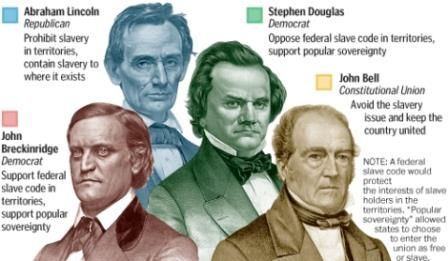
Free Republic University, Department of History presents U.S. History, 1855-1860: Seminar and Discussion Forum
Bleeding Kansas, Dred Scott, Lincoln-Douglas, Harper’s Ferry, the election of 1860, secession – all the events leading up to the Civil War, as seen through news reports of the time and later historical accounts
First session: November 21, 2015. Last date to add: Sometime in the future.
Reading: Self-assigned. Recommendations made and welcomed.
Posting history, in reverse order
To add this class to or drop it from your schedule notify Admissions and Records (Attn: Homer_J_Simpson) by reply or freepmail.
Link to previous Harper’s Weekly thread
To: chajin; henkster; CougarGA7; BroJoeK; central_va; Larry Lucido; wagglebee; Colonel_Flagg; Amagi; ...
Beginning with the May 26 edition and continuing through the June 30 edition there was a problem with the original copies from which the pdf files were created. There was apparently water damage along the spines of the magazines so there are blank spots on the bottom corners of each page, which translates in to blank spots on every page or so of my recreated. I have omitted a few articles that have serious gaps in them. I have included the serials that some readers may be following even when there are gaps. The June 30 issue is the worst and the problem appears to end there. I will add a notice if it starts again.
Lost in the Fog, in Two Chapters – 1, 3
The Swans in the Central Park – 2-4
Editorials – 4
The Lounger – 4-6
Humors of the Day – 6
The Regatta of the New York Yacht Club – 6-8
Palermo – 8-9
Domestic Intelligence – 8, 10-11
Foreign News – 11-12
General View of the Central Park – 13-14
A Story of Niagara – 14-16
The Woman in White, by Wilkie Collins, Walter Hartright’s Narrative Continued – 16-19
A Shark! A Shark! – 19-20
Shah Noshirwan, King of Persia – 20
Captain Brand of the Schooner “Centipede,” by Lieut. Henry A. Wise, U.S.N. (Harry Gringo). Chapter XX-XXI – 21-22
Muscular Education-The Private Tutor - 23
2 posted on
06/16/2020 6:36:58 AM PDT by
Homer_J_Simpson
("Every nation gets the government that it deserves." - Joseph de Maistre (1753-1821))
To: chajin; henkster; CougarGA7; BroJoeK; central_va; Larry Lucido; wagglebee; Colonel_Flagg; Amagi; ...
Continued from June 8
(reply #21.)
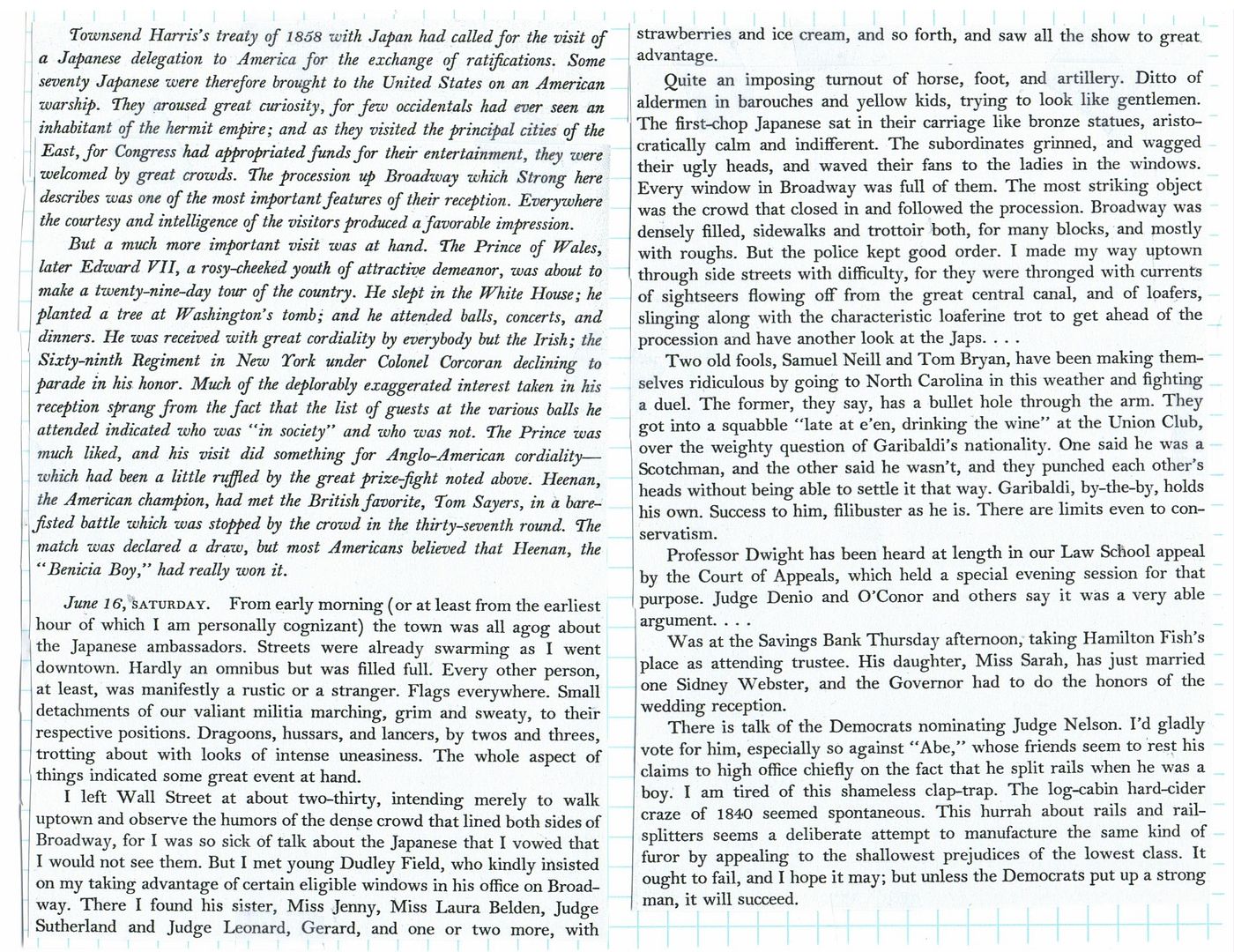
The Diary of George Templeton Strong, Edited by Allan Nevins and Milton Halsey Thomas
3 posted on
06/16/2020 6:40:27 AM PDT by
Homer_J_Simpson
("Every nation gets the government that it deserves." - Joseph de Maistre (1753-1821))
To: chajin; henkster; CougarGA7; BroJoeK; central_va; Larry Lucido; wagglebee; Colonel_Flagg; Amagi; ...
Judge Martin F. Conway to George L. Stearns, June 17, 1860 [BALTIMORE, June 17, 1860.]
Your kind favor of the 15th is at hand. I have no business requiring my presence in Boston at this time; so that if I visit it, I must do so at your account . This, I shall, of course, be glad to do, as much for the pleasure it will afford me personally, as for the accommodation it may be to you.
Should Douglas be nominated by the convention now in session in this city the South will bolt, and Lincoln be elected President; in which case I do not think a movement to prevent his inauguration at all improbable. What would become of Kansas in the confusion which would follow such a proceeding, God only knows. Should Douglas not be nominated, but if the convention unites in some other candidate, Guthrie for example, then Lincoln would not probably be elected, but the Democratic candidate instead. The result of this would be that the present application for Kansas' admission would be discarded, and new proceedings instituted for another state organization founded on Democratic principles.
SOURCE: Preston Stearns, The Life and Public Services of George Luther Stearns, p. 228-9
civilwarnotebook.blogspot.com
Martin F. Conway Wikipedia page
9 posted on
06/17/2020 7:18:44 AM PDT by
Homer_J_Simpson
("Every nation gets the government that it deserves." - Joseph de Maistre (1753-1821))
To: chajin; henkster; CougarGA7; BroJoeK; central_va; Larry Lucido; wagglebee; Colonel_Flagg; Amagi; ...
Continued from May 18
(reply #34). 1
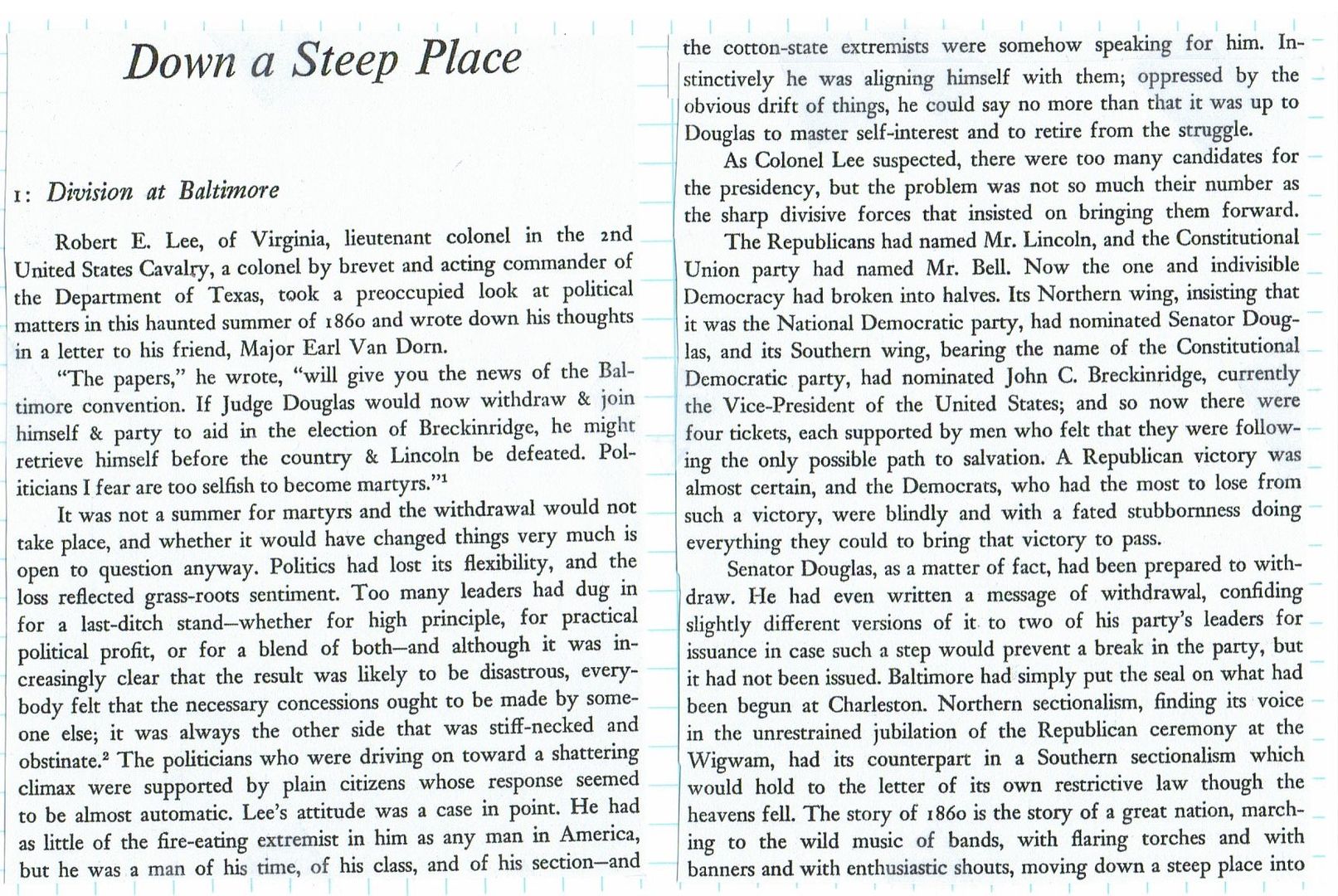
2
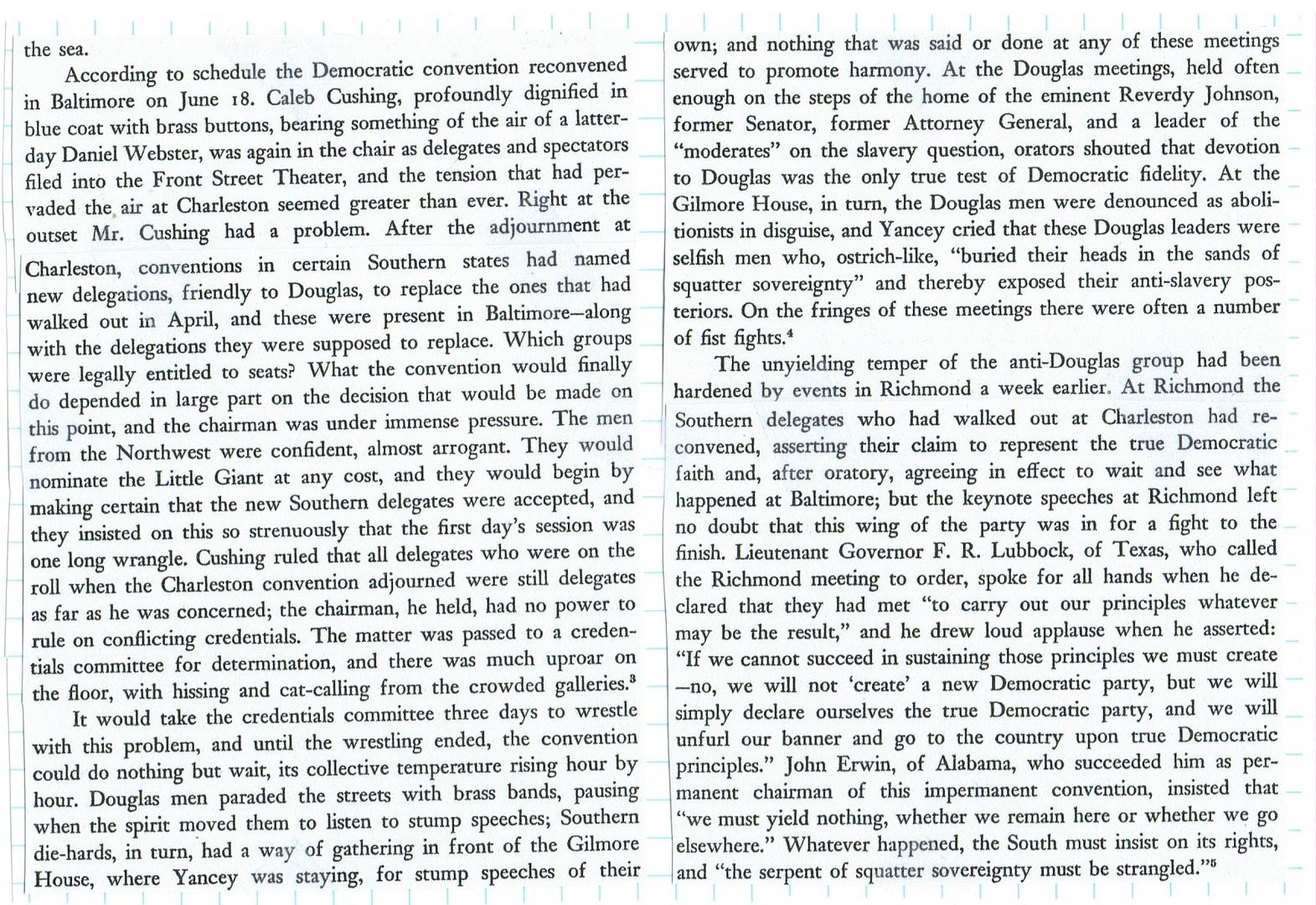
Bruce Catton, The Coming Fury
10 posted on
06/18/2020 6:15:59 AM PDT by
Homer_J_Simpson
("Every nation gets the government that it deserves." - Joseph de Maistre (1753-1821))
To: chajin; henkster; CougarGA7; BroJoeK; central_va; Larry Lucido; wagglebee; Colonel_Flagg; Amagi; ...
John M. Forbes to Nassau William Senior, June 18, 1860 BOSTON, June 18,1860.
MY DEAR MR. SENIOR, — Thinking you may be interested in the antecedents of our promised ruler Lincoln, I send through my bookseller a copy of his speeches (and Douglas's) during their great fight for the Illinois senatorship — which form his chief record.
From such of them as I have read I get the idea that he is an earnest, rough, quick-witted man, — persistent and determined, half educated, but self-reliant and self-taught. These speeches, made before Seward's, show that Lincoln originated in these latter days the utterance of the “irrepressible conflict,” — and what is more, stuck to it manfully. Those who know him assure me that he is honest and straightforward and owned by no clique of hackneyed politicians.
Seward was killed by his association with the politicians who joined in the plundering of the last New York legislature, and by his speech in the Senate ignoring the irrepressible conflict and smoothing over his supposed radicalism.
The first evil lost him the confidence of the right sort of men, not because they believed him corrupt, but from the bad company he had been in and would probably be in again! His latter-day conservatism conciliated his enemies, who would not, however, vote for him, happen what might; and cooled the zeal of his radical supporters, and especially of the country people. I think on the whole the actual nominee will run better and be quite as likely to administer well when in. We shall elect him, I think, triumphantly, by the people; and avoid that abominable expedient, an election by the House, — filled as it is with so large a proportion of mere politicians. There is some danger that we shall be disgusted with a repetition of the log-cabin and hard-cider style of campaigning which was so successful in the Harrison election, but this is a minor evil compared with either having Douglas, with his filibustering crew, or a set of Albany wire-pullers under a Republican administration. . . .
Although you say nothing about it, I still hope you will come out this summer and take care of your young prince and see our heir apparent!
Yours very truly,
J. M. FORBES.
SOURCE: Sarah Forbes Hughes, Letters and recollections of John Murray Forbes, Volume 1, p.183-4
civilwarnotebook.blogspot.com
Victor Hugo: June 18, I860
Grand are the liberators of mankind! Let them hear the grateful applause of the nations, whatever their fortune! Yesterday we gave our tears; to-day our hosannas are heard. Providence deals in these compensations. John Brown failed in America, but Garibaldi has triumphed in Europe. Mankind, shuddering at the infamous gallows of Charlestown, takes courage once more at the flashing sword of Catalafimi.1
_______________
1 Victor Hugo's “Actes et Paroles pendant l'Exil” (1859-60). In the Édition Definitive of his complete works, which was still going through the press at his death, in 1885, the author added this note to the passages cited above: "Victor Hugo avait, à propos de John Brown, prédit la guerre civile à l’Amérique, et, a propos de Garibaldi, prédit 1'unité à l’ltalie. Ces dcux prédictions se réalisèrent.” He had a right to claim this.
SOURCE: Franklin B. Sanborn, The Life and Letters of John Brown, p. 631
civilwarnotebook.blogspot.com
11 posted on
06/18/2020 6:19:36 AM PDT by
Homer_J_Simpson
("Every nation gets the government that it deserves." - Joseph de Maistre (1753-1821))
To: chajin; henkster; CougarGA7; BroJoeK; central_va; Larry Lucido; wagglebee; Colonel_Flagg; Amagi; ...
Continued from June 11
(reply #4).
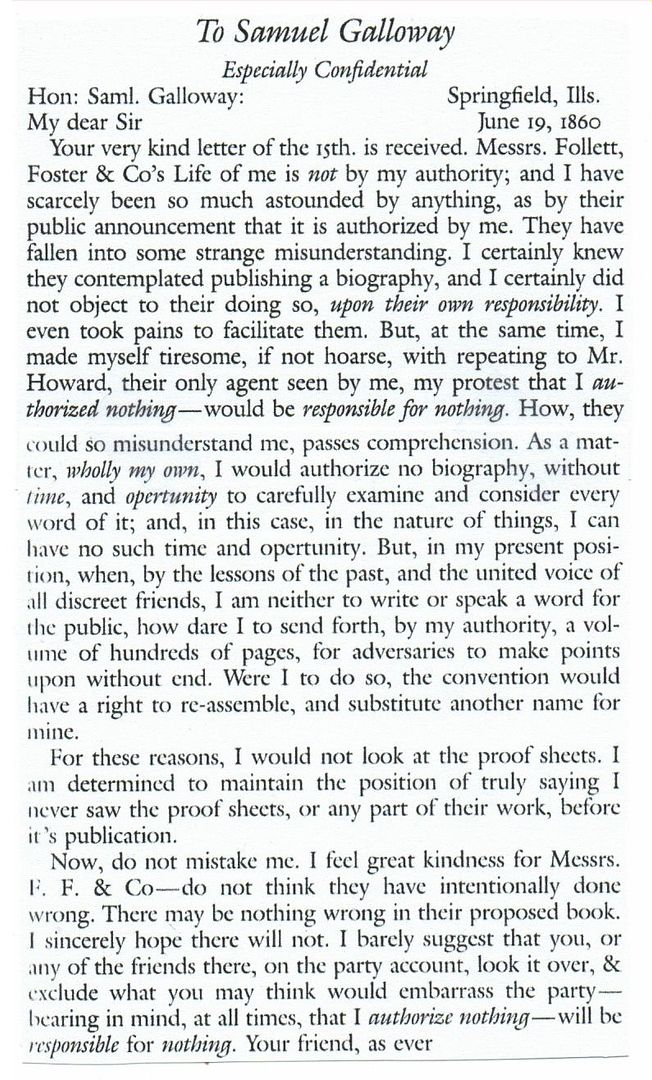
Abraham Lincoln: Speeches and Writings 1859-1865, edited by Don E. Fehrenbacher
14 posted on
06/19/2020 6:05:06 AM PDT by
Homer_J_Simpson
("Every nation gets the government that it deserves." - Joseph de Maistre (1753-1821))
To: chajin; henkster; CougarGA7; BroJoeK; central_va; Larry Lucido; wagglebee; Colonel_Flagg; Amagi; ...
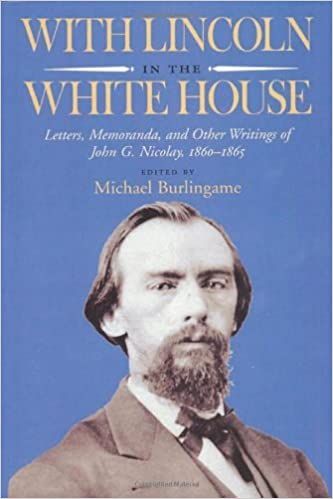
Continued from June 15 (reply #11).
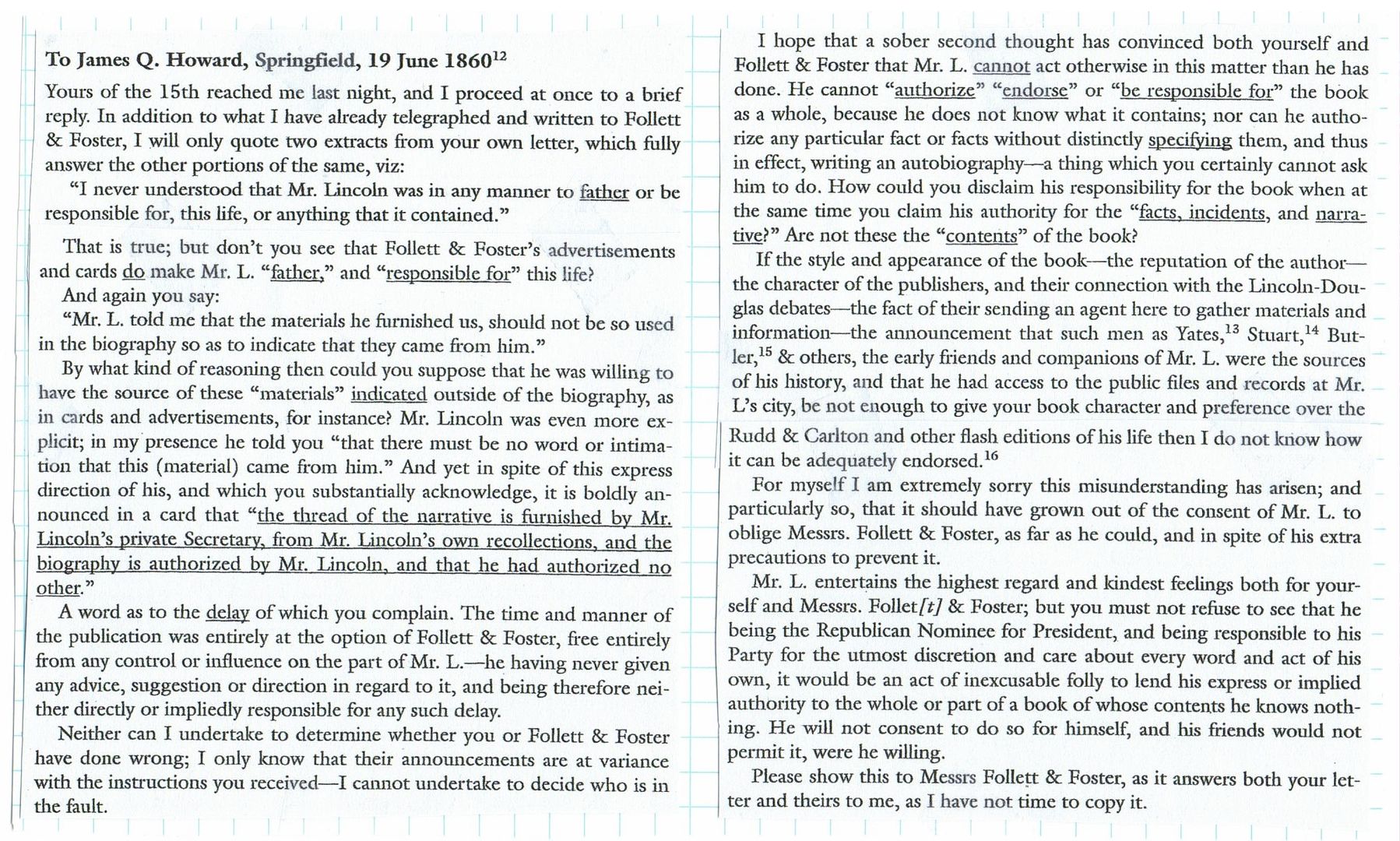
With Lincoln in the White House: Letters, Memoranda, and Other Writings of John G. Nicolay, 1860-1865, edited by Michael Burlingame
15 posted on
06/19/2020 6:07:55 AM PDT by
Homer_J_Simpson
("Every nation gets the government that it deserves." - Joseph de Maistre (1753-1821))
To: chajin; henkster; CougarGA7; BroJoeK; central_va; Larry Lucido; wagglebee; Colonel_Flagg; Amagi; ...
27 posted on
06/22/2020 7:43:59 AM PDT by
Homer_J_Simpson
("Every nation gets the government that it deserves." - Joseph de Maistre (1753-1821))
FreeRepublic.com is powered by software copyright 2000-2008 John Robinson







